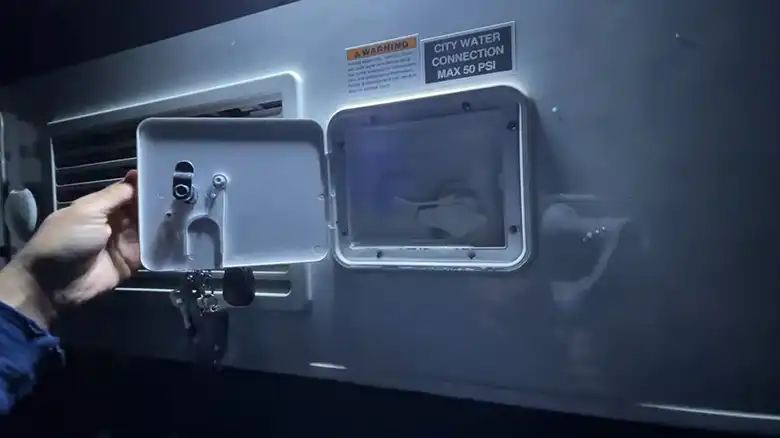For RV enthusiasts, maintaining a steady supply of propane is essential to ensure that heating systems and other propane-dependent appliances function smoothly. Running out of propane, especially in the middle of a trip, can lead to several issues, from the loss of heat to the malfunctioning of critical appliances.
In this comprehensive guide, we’ll explore what happens when your RV furnace runs out of propane, how to troubleshoot the problem, and steps to prevent it from happening in the future.

Why Propane is Crucial for Your RV?
Propane is the lifeblood of many RV systems, powering not just your furnace but also appliances like stoves, water heaters, and refrigerators. This versatile fuel source is essential for comfort and functionality in your mobile home away from home. Recognizing the critical role propane plays in your RV’s operation is the first step in preventing and managing potential shortages.
When it comes to your RV furnace, propane is the fuel that keeps you warm during those crisp nights under the stars. It’s an efficient and reliable heating source, but like any fuel, it can run out. Understanding the consequences of depleting your propane supply and knowing how to handle such situations is essential for every RV owner, from weekend warriors to full-time nomads.
How to Spot Low Propane Levels in Your RV Furnace
Before your furnace completely runs out of propane, your RV will likely give you some warning signs. Being attuned to these indicators can help you take preemptive action and avoid complete propane depletion.
One of the most noticeable signs is weak or flickering flames in propane appliances. If you observe that the flame on your stove or water heater isn’t as strong as usual, it could indicate that your propane levels are getting low. This change in flame appearance is due to the decreased pressure in the propane tank as it nears empty.
You might also notice reduced heating efficiency from your furnace. If you find yourself adjusting the thermostat higher than usual to achieve the same level of warmth, it could be a sign that your propane supply is dwindling.
Unusual odors near the propane tank or appliances can also be a red flag. Propane has a distinct, sulfur-like smell added to it for safety reasons. If you detect this odor, it could indicate a leak or low levels in your system.
Lastly, if you experience difficulty starting the furnace or other propane-powered devices, it might be time to check your propane levels. As the tank nears empty, there may not be enough pressure to properly ignite your appliances.
Immediate Consequences of Running Out of Propane
When your RV furnace exhausts its propane supply, several immediate effects occur, and it’s crucial to be prepared for these consequences.
The most obvious and immediate effect is the loss of heat. Your furnace will stop producing warmth, which can quickly lead to uncomfortable or even dangerous cold conditions inside your RV. This sudden loss of heat can be particularly problematic if you’re camping in low temperatures or if you have temperature-sensitive items or pets on board.
Modern RV furnaces are equipped with safety features that automatically shut down the system when propane levels are critically low or depleted. This system shutdown is a protective measure designed to prevent damage to the furnace and ensure your safety. While it may seem inconvenient at the moment, it’s an important safeguard against potential hazards.
If your furnace has a pilot light, it will go out when propane runs out. This pilot light extinguishment means you’ll need to manually relight it once you’ve replenished your propane supply. The process of relighting a pilot light can be tricky and potentially dangerous if not done correctly, so it’s essential to follow manufacturer instructions carefully or seek professional help if you’re unsure.
Perhaps less obvious but equally important is the potential for air to enter the gas lines when propane tanks are completely emptied. This air infiltration can cause issues when refilling and restarting the system, potentially leading to irregular burning or difficulties in relighting appliances.
Potential Dangers of Running Out of Propane in Your RV
Running out of propane in your RV isn’t just an inconvenience; it can pose several significant risks that every RV owner should be aware of.
In cold weather, the lack of heat can lead to freezing temperatures inside your RV. This drop in temperature isn’t just uncomfortable; it can cause pipes to freeze and potentially lead to severe water system damage. Frozen and burst pipes can result in costly repairs and put a damper on your RV adventure.
If you find yourself without propane heat, you might be tempted to use alternative heating methods. However, improper use of these alternatives without adequate ventilation can lead to a dangerous buildup of carbon monoxide. This odorless, colorless gas is extremely hazardous and can be life-threatening in enclosed spaces like an RV.
Similarly, the use of alternative heating sources, especially those not designed for RV use, can increase the risk of fire. RVs have limited space and are often constructed with materials that can be highly flammable, making fire safety a top priority.
Lastly, exposure to extreme cold, especially for vulnerable individuals such as young children, the elderly, or those with certain health conditions, can lead to health risks like hypothermia. It’s crucial to maintain a safe internal temperature in your RV at all times.
What to Do When Your RV Furnace Runs Out of Propane
If you find yourself in a situation where your RV furnace has run out of propane, it’s important to act quickly and safely. Follow these steps to address the situation:
First and foremost, turn off all propane appliances and the main propane valve. This precautionary measure prevents any potential gas leaks or unsafe conditions when you eventually refill and restart your system.
Next, take the time to thoroughly ventilate your RV. Open windows and doors to allow fresh air to circulate. This step is crucial in preventing any potential gas buildup and ensuring a safe environment inside your RV.
The next priority is to refill your propane tank as soon as possible. If you’re at a campground, they may offer propane refill services. Otherwise, you might need to locate the nearest propane supplier. Many gas stations, hardware stores, and RV supply shops offer propane refills.
Once you’ve refilled your propane tank, it’s time to carefully relight pilot lights and restart appliances. This process should be done following the manufacturer’s instructions for each appliance. Pay close attention to any specific safety procedures outlined in your RV’s manual.
If you’re unsure about any part of this process, it’s always better to err on the side of caution and seek professional assistance. Many RV service centers and some campgrounds offer professional propane services to ensure everything is reconnected safely and correctly.
Remember, safety should always be your top priority when dealing with propane systems in your RV. Taking the time to handle the situation correctly can prevent accidents and ensure your RV systems function properly once propane is restored.
How to Prevent Propane Shortages in Your RV?
While knowing how to handle a propane shortage is important, preventing the situation altogether is even better. Here are some strategies to help you avoid running out of propane in your RV:
Regular monitoring of your propane levels is key. Make it a habit to check your propane levels frequently, especially before and during trips. Some RVs come with built-in propane gauges, while others may require aftermarket solutions. Regardless of the method, staying aware of your propane levels can help you avoid unexpected shortages.
Consider installing a propane gauge if your RV doesn’t already have one. These devices provide accurate readings of your tank’s propane levels, taking the guesswork out of monitoring your supply. Some modern gauges even connect to smartphone apps, allowing you to check your levels remotely.
It’s always a good idea to carry a spare propane tank, especially for longer trips or when traveling to remote areas. A backup tank can be a lifesaver in emergency situations, providing you with a reserve supply of propane when you need it most.
Planning your refills in advance can also help prevent propane depletion. Before embarking on your journey, research and note the locations of propane refill stations along your route. Many RV parks and campgrounds offer propane refill services, and there are also apps and websites dedicated to helping RVers locate propane suppliers.
Lastly, conducting routine maintenance on your propane system is crucial. Regular servicing can improve efficiency, helping your propane last longer, and also allows for early detection of potential issues. Have a certified RV technician inspect your propane system annually to ensure everything is in good working order.
Conclusion
Running out of propane in your RV furnace can be more than just an inconvenience—it can pose safety risks and potentially damage your RV systems. By understanding the signs of low propane, knowing how to respond when it runs out, and implementing preventive measures, you can ensure a safer, more comfortable RV experience. When in doubt, always consult with a professional to handle propane-related issues in your RV. By staying informed and prepared, you can enjoy your RV adventures with peace of mind, knowing you’re equipped to handle propane-related challenges. Safe travels and happy camping!


